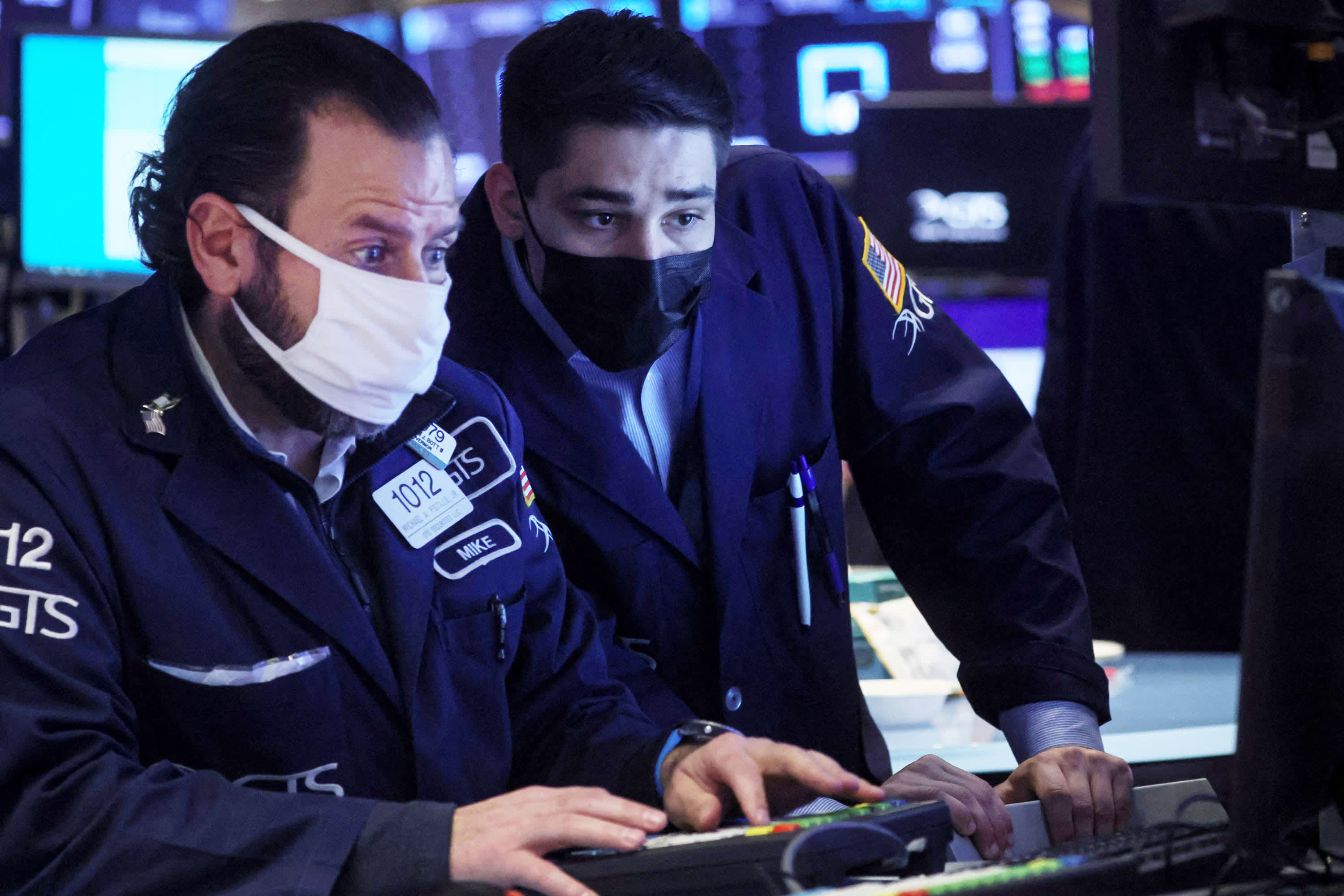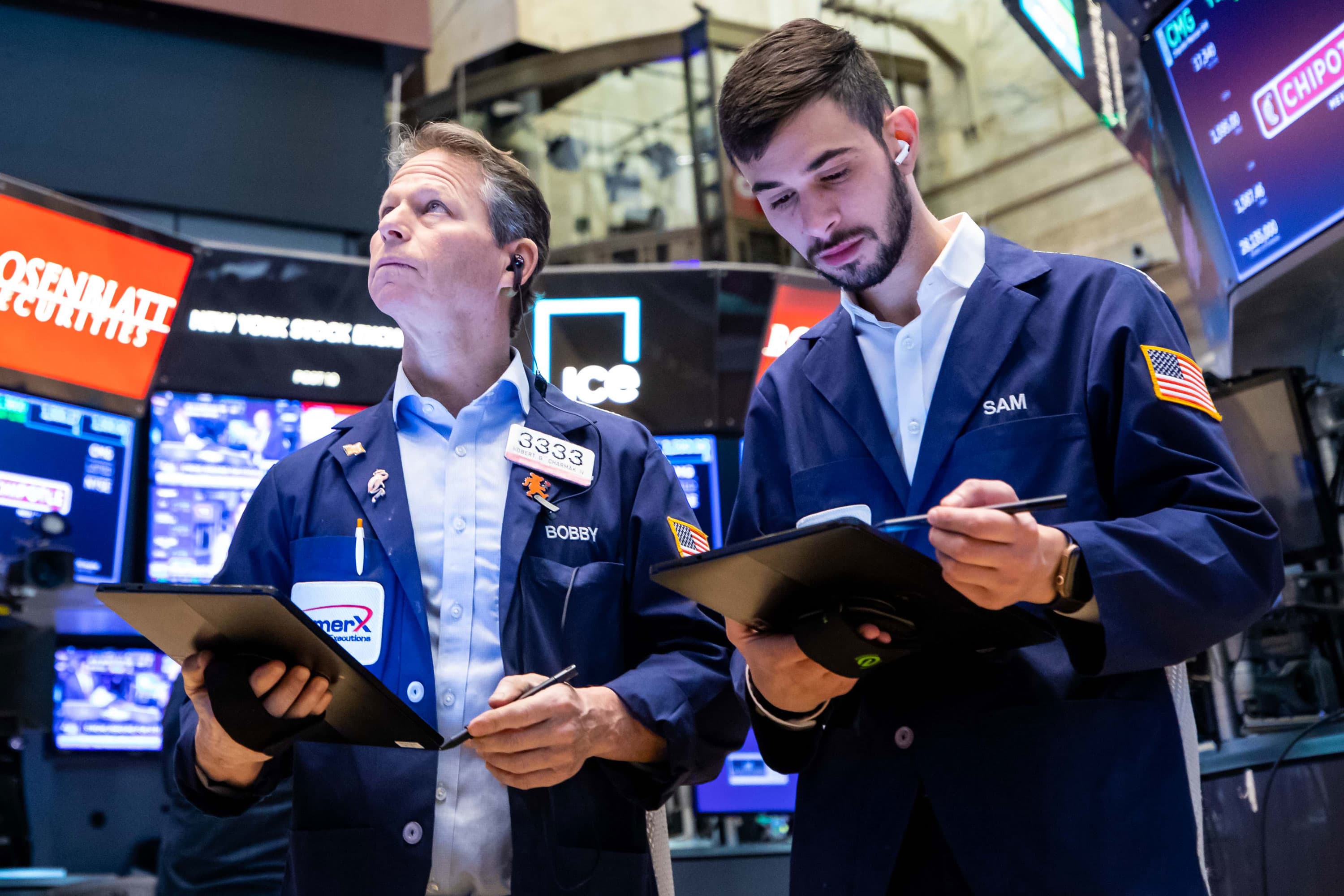Dow falls as Wall Street assesses rising tensions between Russia and Ukraine
The Dow Jones Industrial Average dipped on Tuesday as traders continue to monitor brewing tensions between Russia and Ukraine.

Traders work on the floor of the New York Stock Exchange (NYSE) in New York City, January 25, 2022.
Brendan McDermid | Reuters
The Dow Jones Industrial Average dipped on Tuesday as traders continue to monitor brewing tensions between Russia and Ukraine.
The Dow Jones Industrial Average dropped about 120 points, after dropping more than 300 points shortly after the open. The S&P 500 was flat, and the Nasdaq Composite slipped by 0.05%. The U.S. stock market was closed Monday due to the President's Day holiday.
Oil prices rose, with West Texas Intermediate futures jumping 4.5% to $95.19 per barrel. Energy stocks bucked the broader market's trend with Exxon Mobil rising 1.8% and ConocoPhillips adding 2.8%.
Russian President Vladimir Putin said Monday that he would recognize the independence of two breakaway regions in Ukraine, potentially undercutting peace talks with President Joe Biden. That announcement was followed by news that Biden was set to order sanctions on separatist regions of Ukraine, with the European Union vowing to take additional measures.
Putin later ordered forces into the two breakaway regions.
"The Russia/Ukraine situation remains very fluid, and tensions remain high, and in the short term that will remain a headwind on stocks, said Tom Essaye, founder of Sevens Report.
U.K. Health Minister Sajid Javid said Tuesday that "the invasion of Ukraine has begun." U.S. President Joe Biden has not yet used the word "invasion" to describe the current activity. The U.K. has also started targeted economic sanctions against five Russian banks and three wealthy individuals.
The news came after the White House said Sunday that Biden has accepted "in principle" to meet with Putin in yet another effort to deescalate the Russia-Ukraine situation via diplomacy. White House press secretary Jen Psaki said the summit between the two leaders would occur after a meeting between Secretary of State Antony Blinken and his Russian counterpart Sergey Lavrov.
Stock picks and investing trends from CNBC Pro:
The Russia-Ukraine conflict has put pressure on market sentiment recently, with the major averages posting back-to-back weekly losses. The Dow fell 1.9% last week, and the S&P 500 and Nasdaq Composite slid 1.6% and 1.8%, respectively.
"While Monday's episode will have important implications for Russia's political relations with foreign partners, a significant market event is likely avoided for the time being, but the trajectory in the coming weeks will be important to monitor from a rising market risk perspective," said Ed Mills of Raymond James.
Home Depot reported quarterly profit of $3.21 a share, three cents better than estimates, and said it sees earnings and revenue growth this year. Shares, however, fell 4.5%.
Meanwhile, Macy's popped more than 3% in premarket trading after beating on the top and bottom lines of its quarterly results. Macy's also authorized a new $2 billion share buyback program and announced a 5% dividend increase
In deal news, Houghton Mifflin Harcourt shares surged 14.4% after the company said it would be taken private by Veritas Capital in a deal worth $21 a share, representing a nearly 16% premium from Friday's close. The deal is expected to be completed in the second quarter.
On the economic data front, the IHS Markit manufacturing PMI rose to 52.5 in February from 50.5. The IHS Markit services PMI jumped to 56 in February from 51.1 the month prior.
Traders are also keeping an eye on the Federal Reserve, as the U.S. central bank is expected to raise rates multiple times starting next month. Traders are betting that there is a 100% chance of a Fed rate hike after the March 15-16 meeting, with expectations tilting toward a 0.25 percentage point move, according to the CME Group's FedWatch tool.
Expectations of tighter monetary policy have put pressure on stocks, particularly those in rate-sensitive sectors like tech, and have sent Treasury yield sharply higher to start 2022. The benchmark 10-year Treasury yield ended last week around 1.93% after briefly breaking above 2%. The 10-year began 2022 trading at around 1.51%.
"All eyes are on the Fed," Strategas investment strategist Ryan Grabinski wrote in a note released Friday evening. "As of today, the market is expecting the Fed to raise interest rates at nearly every meeting this year. Despite that, we left Monetary Policy as Favorable for now because the Fed is continuing to purchase Treasuries (an accommodative policy action)."
Subscribe to CNBC PRO for exclusive insights and analysis, and live business day programming from around the world.

 Tekef
Tekef 































